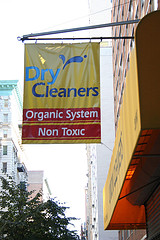
 There may be some clothes hanging in your closet that you just can’t throw in the washer. That favorite linen blouse, expensive suit, or leather jacket. Dry cleaners use chemicals, though. You can smell them when you get the garment back. Is there any way to avoid more toxins in your home and still get your favorite outfits cleaned?
There may be some clothes hanging in your closet that you just can’t throw in the washer. That favorite linen blouse, expensive suit, or leather jacket. Dry cleaners use chemicals, though. You can smell them when you get the garment back. Is there any way to avoid more toxins in your home and still get your favorite outfits cleaned?
Most dry-cleaning shops use a chemical called “perchloroethylene” (perc) as the primary cleaning solvent. According to the National Institute of Environmental Health Sciences, “Short-term exposure to PERC can cause adverse health effects to the nervous system that include dizziness, fatigue, headaches, sweating, incoordination, and unconsciousness. Long-term exposure can cause liver and kidney damage.” The International Association for Research on Cancer classifies perc as a probable carcinogen.
According to the National Institute for Occupational Safety and Health (NIOSH), approximately 85% of drycleaning shops in the U.S. use Perc as their primary solvent.
Fortunately there are other options. According to Grinningplanet.com, these include wet cleaning (a system that uses biodegradable soap and water, computer-controlled dryers, and stretching machines); techniques using carbon dioxide; and alternative petroleum solvents such as Exxon DF-2000 or Chevron-Phillips’ EcoSolv. According to the Environment, Health & Safety Online (EHSO), researchers are developing other methods as well, such as using a water-based process with ultrasonic energy, and a process based on glycol ethers.
So what about organic dry cleaners? Can you trust them to use these alternative methods? Green Daily says it’s not that easy. As with other products, there is no regulation on the word “organic” in dry cleaning, so a company claiming to be organic may still use perc. If it’s certified by the International Fabricare Institute, that’s still is no guarantee, as that simply means the facility is operating in an environmentally responsible fashion. So basically, there’s no way to tell if an organic establishment is any less toxic than a regular one, except by asking.
Ask your dry cleaner what they use to clean. Though proponents of DX-2000 claim it is safer than perc, it’s still a petrochemical that the EPA says can cause skin and eye irritation for workers, so right now, wet-cleaning seems to be the least toxic option out there. If your dry cleaner offers wet-cleaning, request that option for your clothes. The Sierra Club recommends that if you still smell that tell-tale chemical odor of perc when you get your blazer back, try another dry cleaner, and remove the wrapper outside or in your garage and let your clothes air out for at least a day before wearing them. (This will cut down on the chemicals emanating from your closet.) Buy clothes that don’t need to be dry cleaned, and choose spot cleaning and a press when you can.
Have you found a toxin-free dry cleaner? Let us know about it.
Photo courtesy of Ly.Kevin via Flickr.com.

